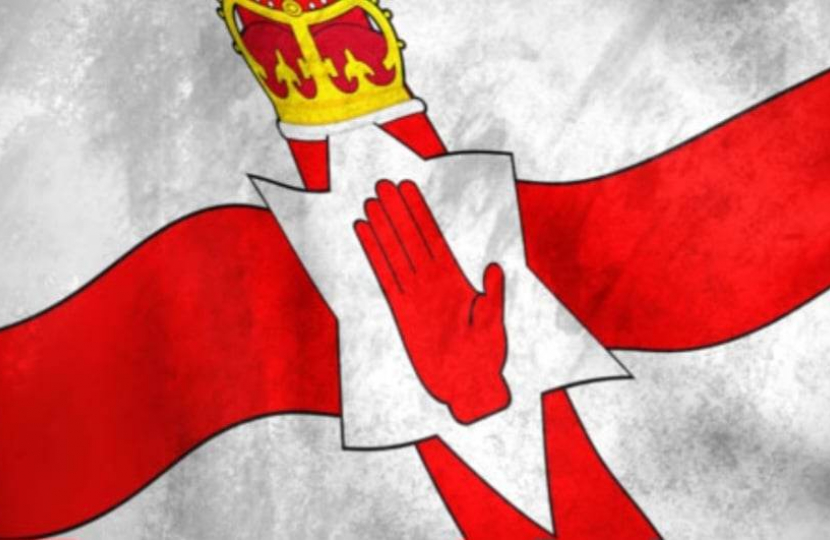
BY RT HON SIR ROBERT BUCKLAND KBE KC MP, former Lord Chancellor & Secretary of State for Justice and former Secretary of State for Wales. He is a member of the Commons Northern Ireland Affairs Select Committee.
Unlike Winston Churchill, I have never thought that the steeples of Fermanagh and Tyrone were dreary. For me, Northern Ireland is a beautiful and fascinating place, with extraordinary people. It reminds me very much of the South West part of Wales where I grew up. I am a Unionist to my bones; it is my Unionism that was key in shaping my political beliefs as I chose the Conservative way. I am pleased, therefore, to be able to make a direct contribution to the political life of Northern Ireland by serving as a member of the Commons Select Committee on Northern Ireland affairs.
We are living through a critical time. When I wrote for Conservative Home about the Government’s policy on the Northern Ireland Protocol on 15th June 2022, I was satisfied that there was a legal and political case for the Northern Ireland Protocol Bill. I wrote then that a stance of “masterly inactivity” by the Government in the face of significant disruption to trade across the Irish Sea between Northern Ireland and Great Britain was not a wise course of action. Both the Protocol at Article 13(8) and the Withdrawal Agreement at Article 164(5)(d) allow for a renegotiation of its terms and for changes to the Protocol’s text to be made to address difficulties or unforeseen situations. Back in mid 2022, neither the EU nor the Irish Government was even prepared to admit that the Protocol as agreed in late 2019 was anything other than the correct way forward. Even though informal talks between EU and UK officials had continued, the EU was unwilling to change its formal mandate and to allow proper negotiations to take place. With Article 16 of the Protocol, which would allow the UK to take unilateral action if serious difficulties were being experienced, offering only a possible but highly uncertain pathway forward for the UK, resort to the Northern Ireland Protocol Bill was the only way to deal with current disruption and continuing uncertainty.
I supported the Bill’s passage through the Commons last year. Now, as the Bill sits in the House of Lords awaiting further progress, I firmly believe that the situation has fundamentally changed. The Bill has outlived both its legal necessity and its political usefulness. It is a dead letter.
The most important change of circumstances has been firstly an acknowledgement by both the EU and the Irish Government that there are problems with the Protocol that need addressing. This was followed by the opening of formal negotiations between the EU and the UK, which, we are told, have yielded fruit in the form of a proposed agreement that will deal with many if not all of the concerns of the UK and of Unionists more generally. We need to disregard the noise and froth about the process and what it means for domestic politics. The stakes for the UK are far, far higher than that. The key questions are these: does the substance of any agreement enhance the stability of Northern Ireland’s institutions within our United Kingdom? Secondly, does enhance UK’s ability to make agreements on a range of other issues with the EU, its members and the nations of the wider world? The Prime Minister is mindful of these questions; he knows that this issue is fraught with risks, but at the heart of his approach is a steadfast belief in and support for the Union of the United Kingdom and an understanding that an improved Protocol will strengthen our country.
A failure of political leadership at this sensitive time in the history of Northern Ireland risks a return to division and even some disorder. The Prime Minister is doing his part; it is time for others to follow his lead, to accept that in this instance the perfect is the enemy of the good and that an improved deal on the Protocol will benefit the people of Northern Ireland, whose interests should take precedence over all other things. The attempt to murder a senior police officer by dissident Republicans this week was a chilling reminder of the danger posed, even by a tiny and unrepresentative minority, to peace itself. If the agreement deals with the issues of VAT, State Aid and goods from Great Britain that are clearly only destined for Northern Ireland, then it will have comprehensively addressed the practical concerns of businesses and residents and deserves support.
The Northern Ireland Protocol Bill has achieved its primary purpose in getting the EU to the negotiating table. In helping to achieve that, the legal argument of necessity, meaning that unliateral legislation by the UK was the only option available to counter the threat of disruption, has been decisively undermined. Importantly, the Bill cannot as a matter of international law end the reach of the EU Court of Justice (CJEU) into Northern Ireland. Firstly, whilst the Bill gives UK Ministers the power to disapply EU Law and the operation of the CJEU, importantly it allows Ministers to reapply EU Law if they consider it appropriate. In other words, it cannot purport to change the terms of the Protocol itself, but to change the way in which these terms be applied by the UK. Only a renegotiation of the Protocol itself under Article 13(8) could limit or remove the jurisdiction of the CJEU in Northern Ireland as a matter of international law. Secondly, if the Bill becomes law, the risk of a successful infraction challenge by the EU means that the UK would be bound as a matter of international law to comply with an unfavourable decision of the CJEU. Only a change to the Protocol itself via negotiation can end or limit the CJEU’s role.
It is increasingly clear that the second political aim of the Bill, namely the return of the DUP to the Stormont Executive, is not linked to its Parliamentary fate. The Northern Ireland Executive Formation Bill that was passed by the Commons a few days ago will extend the deadline for forming an Executive in Stormont without the need for a further election to late January 2024. If the DUP does not choose to support a negotiated improvement to the Northern Ireland Protocol at this stage, then I am increasingly pessimistic about their willingness to enter a new Executive this year, whatever happens with the Protocol Bill. Other means will have to be deployed to encourage the creation of a new Stormont Government. This could include work to update the St Andrews Agreement, which currently gives the most popular Nationalist and Unionist parties a “golden share” in the formation of the Executive. Something more will need to happen if we are to see a revived devolved government in Belfast.
The Protocol Bill is not only a dead letter, but it is a poisoned pill. If there is no agreement on a revised Protocol, ploughing ahead with the Bill will make practical co-operation on issues such as the small boats crisis well-nigh impossible. As we reach the 25th Anniversary of the Belfast Good Friday Agreement, continued failure to maintain stability in Northern Ireland will undermine our position in the eyes of the USA and other important international partners.
This week is a real opportunity for progress to be made on removing the disruptive effects of the Northern Ireland Protocol. I very much hope that we seize the initiative, drop the Protocol Bill and use the good will generated to achieve other international successes.




